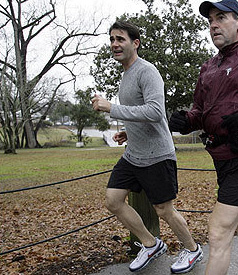Support justice-driven, accurate and transparent news — make a quick donation to Truthout today!
Greenville – Lt. Gov. Andre Bauer has compared giving people government assistance to “feeding stray animals.”
Bauer, who is running for the Republican nomination for governor, made his remarks during a town hall meeting in Fountain Inn that included state lawmakers and about 115 residents.
“My grandmother was not a highly educated woman, but she told me as a small child to quit feeding stray animals. You know why? Because they breed. You’re facilitating the problem if you give an animal or a person ample food supply. They will reproduce, especially ones that don’t think too much further than that. And so what you’ve got to do is you’ve got to curtail that type of behavior. They don’t know any better,” Bauer said.
In South Carolina, 58 percent of students participate in the free and reduced-price lunch program.
Bauer’s remarks came during a speech in which he said government should take away assistance if those receiving help didn’t pass drug tests or attend parent-teacher conferences or PTA meetings if their children were receiving free and reduced-price lunches.
Bauer later Friday told The Greenville News he wasn’t saying people on government assistance “were animals or anything else.”
In his speech, Bauer said people have to become more engaged with government.
“You see, for the first time in the history of this country, we’ve got more people voting for a living than we do working for a living.”
Later in his speech, Bauer said, “I can show you a bar graph where free and reduced lunch has the worst test scores in the state of South Carolina,” adding, “You show me the school that has the highest free and reduced lunch, and I’ll show you the worst test scores, folks. It’s there, period.
“So how do you fix it? Well you say, ‘Look, if you receive goods or services from the government, then you owe something back.'”
Bauer said there are no “repercussions” from accepting government assistance.
“We don’t make you take a drug test. We ought to. We don’t even make you show up to your child’s parent-teacher conference meeting or to the PTA meeting.
“You go to a school where there’s an active participation of parents, and guess what? They have the highest test scores. So what do you do? You say, ‘Look folks, if you receive goods or services from the government and you don’t attend a parent-teacher conference, bam, you lose your benefits.’
“We’re going to have to do things like that. We can’t afford to keep just giving money away.”
And, Bauer said, it is time to confront “babies having babies. Somebody’s got to talk about. Politicians don’t want to talk about it anymore because it’s politically incorrect.”
Bauer told The News later, “People in society have certain responsibilities; just like if you don’t pay your taxes, there are certain repercussions.”
He said government hasn’t made requirements to make those receiving aid be more responsible.
“They can continue to have more and more kids, and the reward is there’s more and more money in it for them.”
Instead, he said, the government should place incentives in its welfare programs, such as providing child care so parents can work or receive education so they can break the welfare cycle.
Government continues to reward bad behavior by giving money to people who “don’t have to do a thing,” he said.
Tymeco Gregory grew up in a single-parent home in which, he said, his family relied on free-lunch programs at school to survive while struggling to pay bills.
“If I didn’t get any money or help with food for school and stuff, we probably would have to go without eating at school,” Gregory said. “We don’t have a lot of extra money.”
Now an 18-year-old freshman physics major at Wofford College, Gregory credited a support system from Furman University’s Bridges to a Brighter Future program and government assistance with helping him achieve his goal to attend college.
Tobi Swartz, director of Bridges to a Brighter Future, declined to comment on Bauer’s remarks but said students can achieve despite their backgrounds if shown the opportunity.
“Income and circumstance does not define you, and young people have the ability to make choices that are their future,” Swartz said.
“We need to provide opportunities and exposure that will provide them the vision for something beyond their circumstances.”
Greenville News staff writer Ron Barnett contributed.
Holding Trump accountable for his illegal war on Iran
The devastating American and Israeli attacks have killed hundreds of Iranians, and the death toll continues to rise.
As independent media, what we do next matters a lot. It’s up to us to report the truth, demand accountability, and reckon with the consequences of U.S. militarism at this cataclysmic historical moment.
Trump may be an authoritarian, but he is not entirely invulnerable, nor are the elected officials who have given him pass after pass. We cannot let him believe for a second longer that he can get away with something this wildly illegal or recklessly dangerous without accountability.
We ask for your support as we carry out our media resistance to unchecked militarism. Please make a tax-deductible one-time or monthly donation to Truthout.
